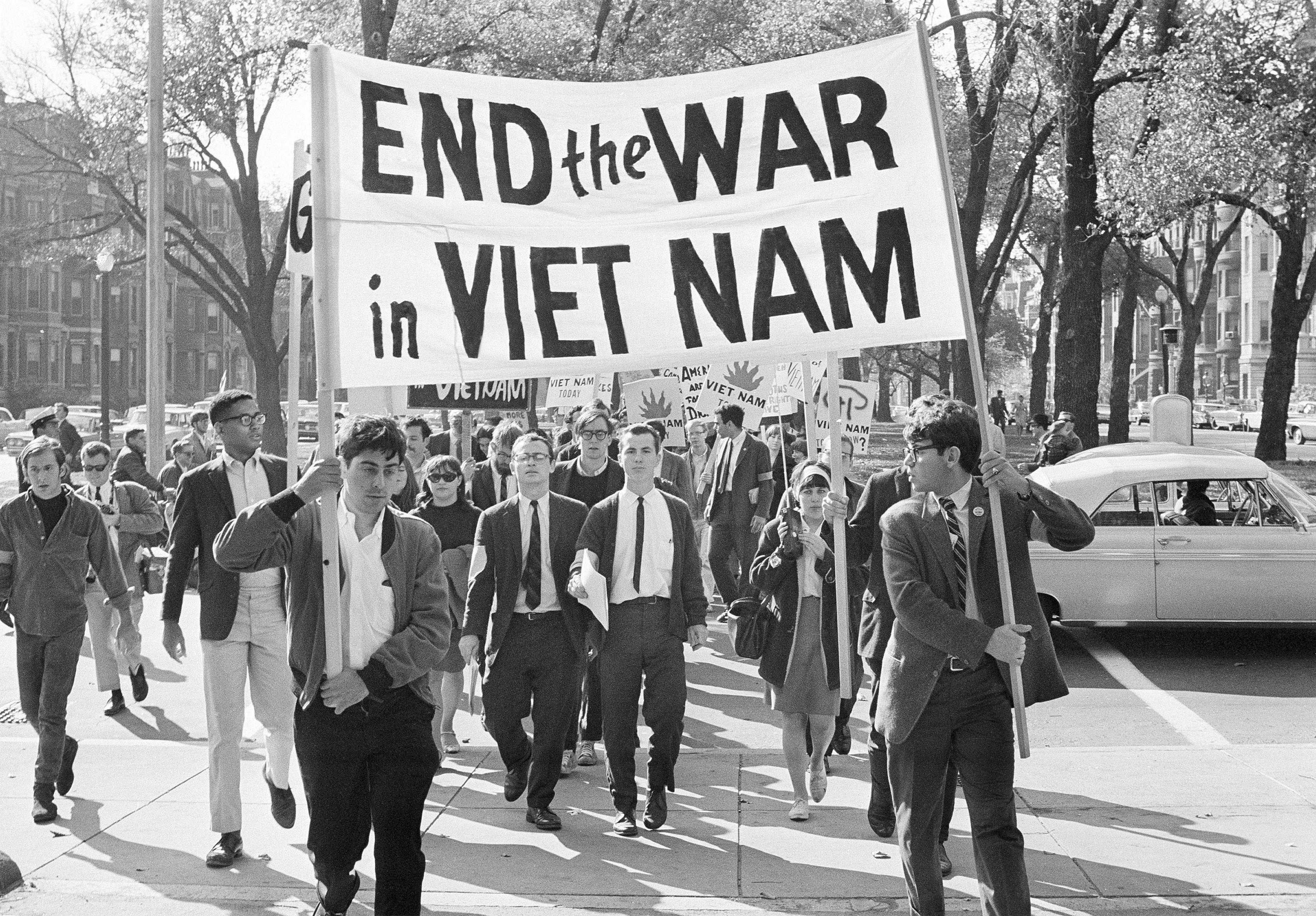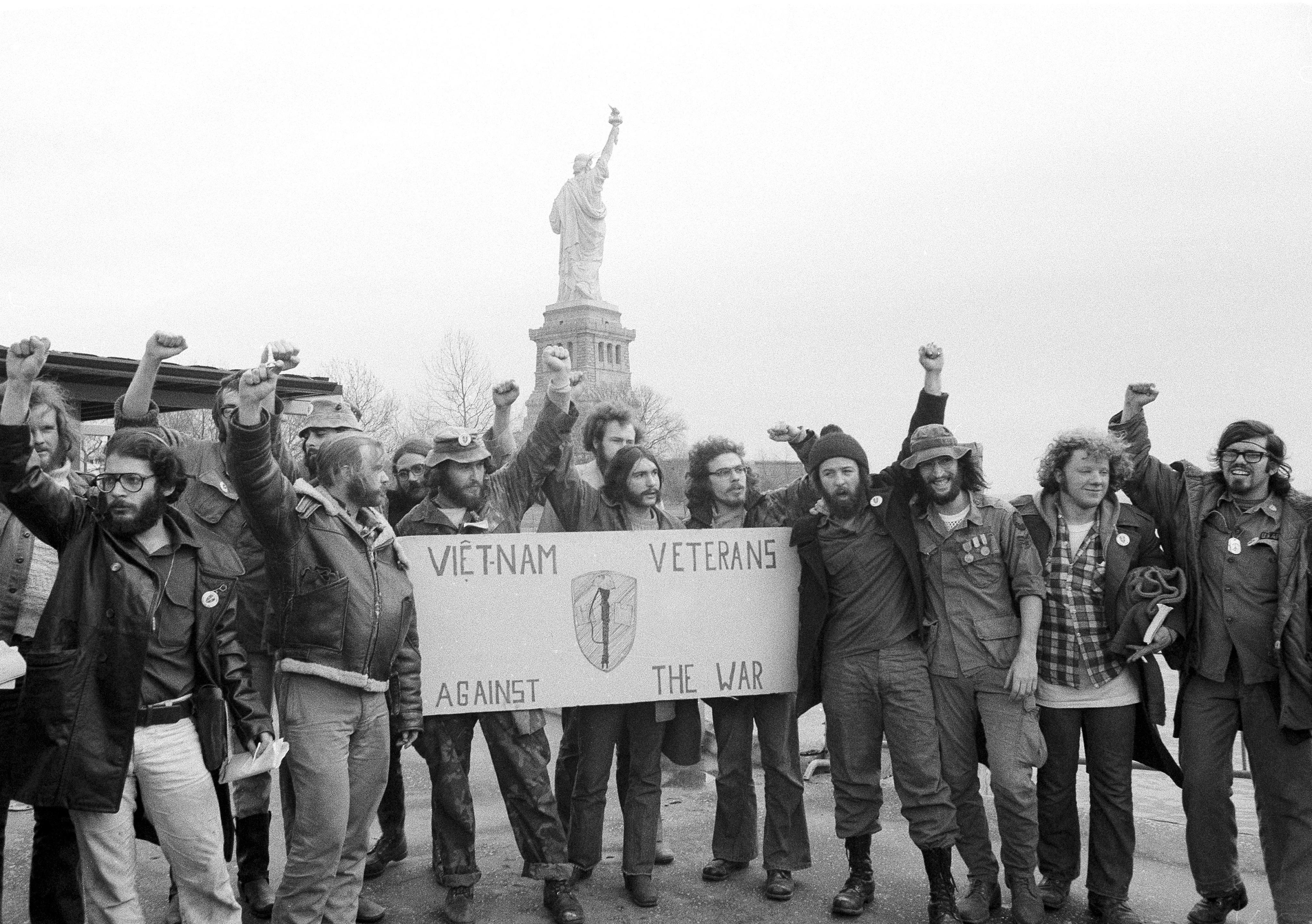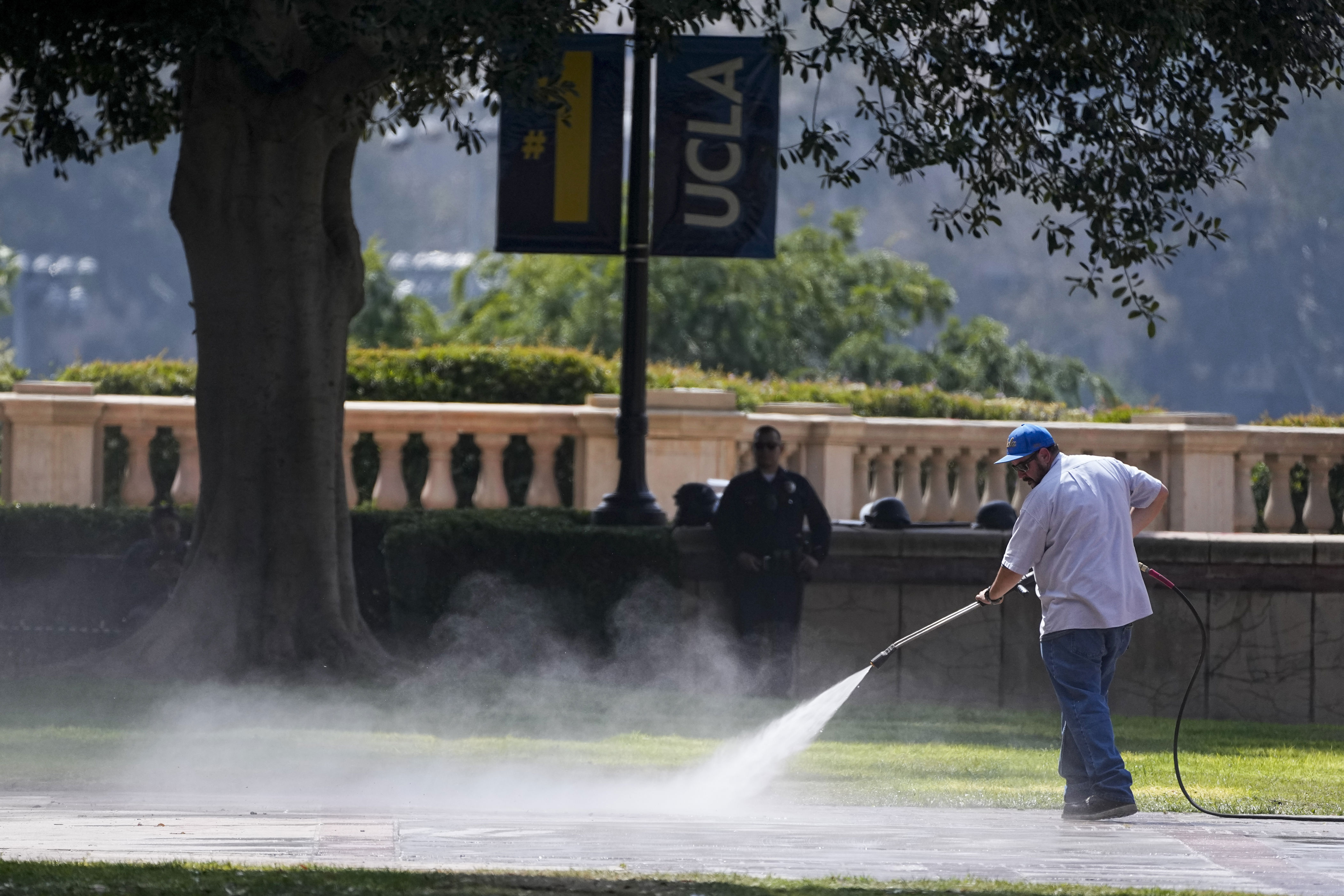The American paradox of protest: Celebrated and condemned, welcomed and muzzled

FILE – College students from various nearby schools march down Commonwealth Avenue in Boston on Oct. 16, 1965 to attend rally on Boston Common protesting U.S. involvement in Vietnam. They’re hallmarks of American history: protests, rallies, sit-ins, marches, disruptions. They date from the early days of what would become the United States to the sights and sounds currently echoing across the landscapes of the nation’s colleges and universities. (AP Photo/Frank C. Curtin, File)
NEW YORK (AP) — They’re hallmarks of American history: protests, rallies, sit-ins, marches, disruptions. They date from the early days of what would become the United States to the sights and sounds echoing across the landscapes of the nation’s colleges and universities during this activist spring.
And just as much a part of that American history? Those same events being met with irritation, condemnation, anger, calls to desist, and at times the use of law enforcement and aggressive tactics to make that happen.
“Dissent is essential for democracy. But dissent must never lead to disorder,” President Joe Biden said Thursday, summing up the enduring national paradox.
Americans cherish the right to assemble, to speak out, to petition for the redress of grievances. It’s enshrined in the first of the constitutional amendments. They laud social actions of the past and recognize the advances toward equality that previous generations made, often at risk of life and limb. But those same activities can produce anger and outright opposition when life’s routines are interrupted, and wariness that those speaking out are outsiders looking to sow chaos and influence impressionable minds.
“The public at large disliked the Civil Rights protesters. The public at large disliked the Vietnam War protesters. And the public at large disliked the women’s movement protesters … and all of the protests that have that basically have occurred going forward,” says Robert Shapiro, professor of political science in the School of International and Public Affairs at Columbia University and an expert on public opinion in American politics.

FILE – A group of demonstrators pause in front of the White House for a prayer, June 14, 1963. Leading the demonstrators is Bishop Smallwood Williams, slightly left of center, of Washington. They’re hallmarks of American history: protests, rallies, sit-ins, marches, disruptions. They date from the early days of what would become the United States to the sights and sounds currently echoing across the landscapes of the nation’s colleges and universities. (AP Photo/Henry Burroughs, File)
But that doesn’t mean protests haven’t had an impact, he says, even if it’s not immediate. “Public opinion changes on the issues as a result of the effectiveness of the protests doing one very important thing, raising the visibility and salience of the issues.”
Consider, for example, the Occupy Wall Street protest of 2011. “It drew attention to economic inequality in the United States,” he says. “People were paying more attention to the conversation thereafter. The issue of economic inequality in the United States has become, and remains, more visible.”
PROTESTS SWELL, AND OPPOSITION TO THEM DOES TOO
Over the last few weeks, protest camps have sprung up and been forced down over the Israel-Hamas war, which has been going on since early October.
The Israeli government launched military action in the Gaza Strip after militants from Hamas killed about 1,200 people and took about 250 more as hostages in an attack on Oct. 7 in southern Israel. The Israeli offensive has killed more than 34,500 Palestinians, according to the Health Ministry in Gaza, as well as caused widespread damage to infrastructure.

FILE – Picketers demonstrate against the Vietnam War as they march through downtown Philadelphia, March 26, 1966. They’re hallmarks of American history: protests, rallies, sit-ins, marches, disruptions. They date from the early days of what would become the United States to the sights and sounds currently echoing across the landscapes of the nation’s colleges and universities. (AP Photo/Bill Ingraham, File)
Pro-Palestinian demonstrators at U.S. schools have been calling on their administrations to cut economic and other ties with Israel or companies they say support the war. The protest encampments started April 17 at Columbia University and have rippled out nationally.
What has also rippled is opposition to the demonstrations. Administrators, under pressure to restore order and normal functioning close to college commencements, have said they support the right to speak but not to disrupt life for other students or violate conduct rules. Police have been called to clear campus encampments all over the country, with more than 2,300 people arrested.
When it comes to protest activity, though, disruption is the point, says Celeste Faison, co-national Director of the Movement for Black Lives network, a coalition of organizations that came together following the Black Lives Matter protests in 2014 that were catalyzed by the death of Michael Brown in Ferguson, Missouri.
“It’s always in those uncomfortable moments and those uncomfortable pushes that change is possible,” she says. “What historically has created change in the United States are those who are willing to put their bodies on the line, their voice on their line, their communities on the line.”

Campus Protests The Paradox
That resonates with Andrew Basta, a fourth-year undergraduate student at the University of Chicago who was spending time on Tuesday at the encampment at that school. Said Basta, 21: “It’s not only fair, but it’s actually, I think, a responsibility on us to be disruptive, to change our lives accordingly and to resist.”

FILE – Members of the Vietnam Veterans Against the War raise clenched fists after ending their 40-hour occupation of State of Liberty, which can be seen behind them, Dec. 28, 1971. They’re hallmarks of American history: protests, rallies, sit-ins, marches, disruptions. They date from the early days of what would become the United States to the sights and sounds currently echoing across the landscapes of the nation’s colleges and universities. (AP Photo/Anthony Camerano, File)
WHERE IS THE LINE DRAWN?

FILE – Race relations problems in the United States were brought to the attention of the nation, and the world, by the massive March on Washington, Sept. 6, 1963. They’re hallmarks of American history: protests, rallies, sit-ins, marches, disruptions. They date from the early days of what would become the United States to the sights and sounds currently echoing across the landscapes of the nation’s colleges and universities. (AP Photo, File)
Rabbi Moshe Hauer would disagree that disruption is necessary. He points to demonstrations and rallies that have taken place over the years with permits and required approvals, and where people made their voices heard without blocking roadways or interrupting life.
The right for people to speak out is one “we absolutely embrace as part of being American, as part of being serious human beings who know that nobody has a monopoly on the truth,” says Hauer, executive vice president of the Orthodox Union, a Jewish organization. “We have to enable ourselves to listen to other voices and people raising their voice, clearly expressing their opinion — whether we like the opinion, whether we dislike the opinion.”

FILE – Anti-Vietnam war demonstrators mass on the Ellipse in Washington on May 9, 1970. They’re hallmarks of American history: protests, rallies, sit-ins, marches, disruptions. They date from the early days of what would become the United States to the sights and sounds currently echoing across the landscapes of the nation’s colleges and universities. (AP Photo/Charles Tasnadi, File)
But he is among those dismayed by the current spate of campus protests. He says they have descended into antisemitism and created an atmosphere that is unsafe for Jewish students and communities. It’s cause for concern, he says, when there is a movement which “chooses to define its tactics by things … which are intimidating, which are threatening, which clearly, clearly, clearly lead to violence.”

FILE – A man power washes the ground as the cleanup continues on the site of a pro-Palestinian encampment, cleared by police overnight, on the UCLA campus, Thursday, May 2, 2024, in Los Angeles. The only thing more American than protests for a cause? Wanting them to pipe down and go away. From the Boston Tea Party to the Civil Rights Movement to last week, U.S. history is filled with the tension between people demonstrating about issues that matter to them and others who want to be left alone. (AP Photo/Mark J. Terrill, File)
Calls for orderly protest have been frequent in American history, at times accompanied by a nostalgia for previous eras that can be misplaced.
“It’s a romanticism of the past that it’s actually not true. For instance, media covers Martin Luther King with a lot of love and reverence. But we know: Back then, he was presented in media as this anarchist disruptor,” Faison says. “At the end of the day, we have a really bad pattern of defaming protesters when they’re in the fight, and then celebrating protesters when they get the win or after they take the risk.”
It’s a sort of “ideological appropriation” when people who were considered radical or crazy at the time of their protests are later considered “on the right side of history,” says Charles McKinney, associate professor of history at Rhodes College, who studies the Civil Rights Movement. “The state’s role then is to incorporate those values while being ambivalent about the process in which those values were incorporated into the nation.”

FILE – Pro-Israel demonstrators gather for the “Bring Them Home Now” rally outside the Columbia University, April 26, 2024, in New York. The only thing more American than protests for a cause? Wanting them to pipe down and go away. From the Boston Tea Party to the Civil Rights Movement to last week, U.S. history is filled with the tension between people demonstrating about issues that matter to them and others who want to be left alone. (AP Photo/Yuki Iwamura, File)
It reinforces the idea that the power of protest isn’t necessarily in convincing people in the present, but in impacting the conversations in the culture. The most potent of American history’s protests — from the Boston Tea Party in 1773 on down — resonated far beyond their eras and, with their enduring notoriety, succeeded.

CAMPUS PROTESTS THE PARADOX
“It works, right?” says Robert Widell, Jr., associate professor of history at the University of Rhode Island, who has studied political movements. “It’s effective in, at the very least, altering the terms of debate and changing the way that people think about a particular issue or a set of issues, or just putting it in people’s brains that something is happening here.”
___
Associated Press journalist Teresa Crawford contributed to this report from Chicago.

FILE – Black Lives Matter protesters march through Portland, Ore. after rallying at the Mark O. Hatfield United States Courthouse on Sunday, Aug. 2, 2020. They’re hallmarks of American history: protests, rallies, sit-ins, marches, disruptions. They date from the early days of what would become the United States to the sights and sounds currently echoing across the landscapes of the nation’s colleges and universities. (AP Photo/Noah Berger, File)

FILE – Dozens of tents were in place as part of a pro-Palestinian protest at the University of Michigan in Ann Arbor, Mich., on Thursday, May 2, 2024. The only thing more American than protests for a cause? Wanting them to pipe down and go away. From the Boston Tea Party to the Civil Rights Movement to last week, U.S. history is filled with the tension between people demonstrating about issues that matter to them and others who want to be left alone. (AP Photo/Ed White, File)
